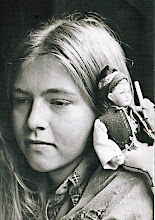The first card was sent in 1904. I can't make out the name of the sender, but it was sent to Leopoldine Miller, who lived a block away from Central Park near Madison Avenue in New York City.

You can see the notation at the top of the card that continues with a dotted line to a building at the bottom of the card. The notation says: Stations of the underground
And, if you look along the quay, you can see where the trains run under the street. The underground, known as the Wiener Stadtbahn, was built between 1894 and 1901. Since the trains were steam powered, a shortage of coal during World War I forced the system to close temporarily. It was reopened with electric trains after the war. Starting in 1976, the system was integrated with Vienna's new subway system. Many of the early Art Nouveau stations designed by Otto Wagner are preserved as landmarks.
There's plenty of action above ground too, with streetcars, horse-drawn carriages, and lots of pedestrians. You may also notice that at this time left-hand drive was still in effect. Here is the back of the card:

The next card was also sent to Loepoldine Miller by the same sender in 1907 (?)

Vienna has a long history of streetcar service, starting with horse-drawn cars in 1865. The first steam-powered trams were added in 1883, followed by electric trams in 1897. Although passengers preferred the electric trams over horse- and steam-powered ones, there were still a few steam-powered lines as late as 1922.
On all of these cards you can see that the front and back platforms of the cars were not glassed in; they were still built on the model of horse-drawn cars, where the conductor would need to be able to control the horses from the platform. To reverse direction, the horses were simply detached from one side of the car and brought to the other - for that reason, both front and back platforms had to be open. By 1910, the electric cars had glass on all sides, providing much better protection from weather.
Here's the back of the card:

And finally, the last card was sent to Mr. Frank Miller in 1908 at the same address, shows the south train station. Originally, the underground Wiener Stadtbahn was supposed to connect to this station too, but the planned line was never built. Still, you can see that it was a hub for streetcars, trains, and horse-drawn carriages.


The message reads:
2/10/1908
Dear Frank,
Before leaving for Prague, where _____ is staying for a couple of weeks, I thank you for the pretty card with the elephant's head. Nature is producing often very curious objects and even subjects. No doubt you enjoyed some fine holydays. Hearty greetings to you and your people from truly yours ____
If you're in Vienna, you may want to plan a trip to the Vienna Tram Museum, which displays 100 original vehicles, including a horse tram built in 1868.


The open ends are interesting. I wonder if they did that so they could be horse drawn too.
ReplyDeleteVery nice images and info. I like the streetcar under the street by the river, but it sure seems vulnerable to high water- you can't just pump it out like you could in a tunnel. I also like the dotted line to the underground building, looks like a single row of raindrops! Vienna looks quite splendid in these images, have to admit I wasn't so impressed by it when I visited in the 80's, maybe I need to go back.
ReplyDeleteIt's always so fun to see multiple postcards from the same sender! And what lovely handwriting this sender has!
ReplyDeleteExcellent views. Vienna has always fascinated, I guess because The Third Man is one of my favorite films.
ReplyDeleteSimply beautiful.
ReplyDeleteFollowing you as I like to look at these vintage places.
Do you have any postcards with the Vienna Hospital as the picture? Thanks :)
ReplyDelete